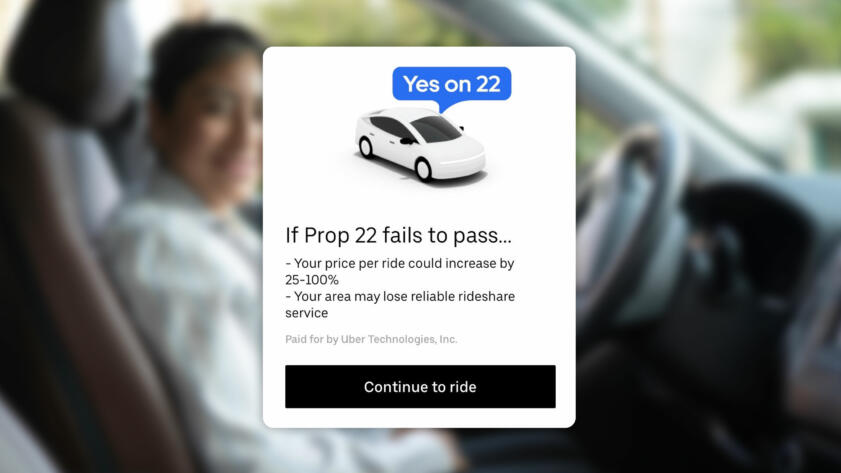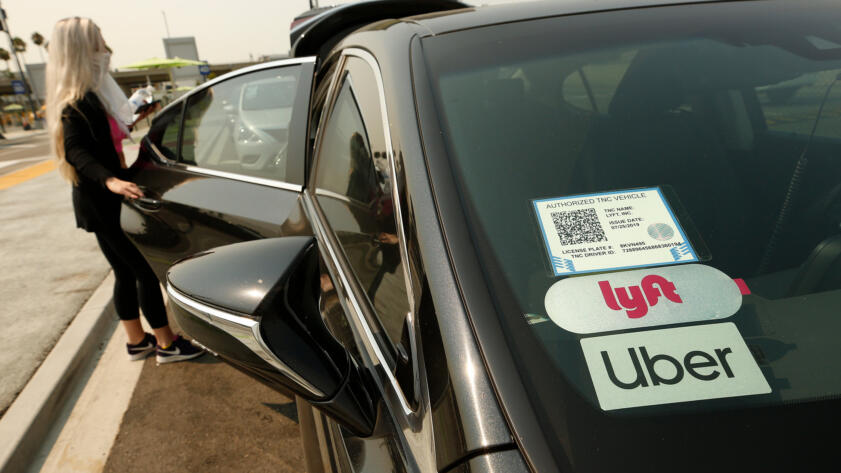A labor bill that would prevent Uber and Lyft drivers from being classified as employees has been quietly working its way through the Washington State House and Senate. If passed, it would be the first law by a state legislature in the country to cement gig worker status as independent contractors.
The bill—which would mandate that drivers receive paid sick leave and a minimum pay rate during fares—has so far faced scant opposition and received little media attention. It comes more than a year after the companies won a ballot measure campaign in California that excluded their drivers from a state law that required that gig workers be classified as employees.

Election 2020
Gig-Worker-Based Tech Companies Are Throwing Everything at a California Election
At stake is a proposition that would limit employment benefits for app-based drivers
State representative Liz Berry, who introduced HB2076, said the measure was the result of years of back-and-forth negotiations between the ride-hail companies and Teamsters Local 117, which runs an affiliated association for ride-hail drivers called the Drivers Union. Testimony at public hearings and emails also show the ride-hail companies and union group were heavily involved in the legislation.
Meanwhile, a coalition of tech companies, including Uber and Lyft, have helped build a more than $2.6 million war chest for a ballot-initiative committee called Washington Coalition for Independent Work, which lists the referendum as “TBD.”
HB2076 passed the state House in a 55 to 42 vote on Feb. 23 and is barreling through Senate committees. It’s expected to come to a vote in the state Senate as soon as next week.
But pressure against the bill is increasing. The National Employment Law Project, NELP, sent a letter last week to all members of Washington’s Senate urging them to vote no on HB2076. The group said the bill doesn’t go far enough in providing benefits to drivers and could set a “dangerous precedent” that paves the way for gig companies to change labor laws elsewhere.
Uber and Lyft didn’t respond to requests for comment on Thursday, and Berry declined to comment.
John Scearcy, the secretary-treasurer for Teamsters 117, said, “Teamsters 117 is proud to stand in solidarity with Uber and Lyft drivers in winning their demands for pay raises, deactivation protections, and historic benefits statewide…. HB 2076 demonstrates the power of drivers when they stand together and advocate to expand fairness.”
The bill is the latest skirmish in a long-standing national fight over whether Uber and Lyft drivers should be classified as employees. The companies’ currently treat drivers as independent contractors, which means those workers don’t have employee benefits such as a guaranteed minimum wage, workers’ compensation, and paid family medical leave. Drivers are also required to cover all their own expenses, such as car payments, maintenance, and gas.
Uber and Lyft, along with other gig companies like DoorDash and Instacart, have spent hundreds of millions of dollars in states across the U.S. to either kill legislation that would make drivers employees or promote laws that would maintain the status quo of workers being classified as independent contractors. Most notably, they collectively spent more than $200 million in California.
HB2076 is similar to proposals in Connecticut and New York that were also backed by Uber and Lyft and supported by local unions. One was never introduced, and the other never made it to a vote. Some lawmakers say the importance of the Washington proposal can’t be overstated.
“This bill has magnitude written all over it,” said state representative Larry Hoff, who opposed HB2076 at a committee hearing in early February. “The size and the impact of this legislation is by far and away the largest thing we’re going to see this session, and probably into sessions here to come.”
Rep. Debra Entenman, who represents several suburbs outside Seattle, was the only Democrat to vote no on the bill in the House. The city of Seattle has instituted a minimum wage for ride-hail drivers (and is currently considering one for food couriers) and created a dispute resolution process for gig workers who may have been unfairly deactivated by the companies, among other protections. If passed, HB2076 would preempt local municipalities from setting their own regulations around worker protections, potentially threatening Seattle and other cities from passing new measures.
Entenman said she spoke to many parties involved in the legislation, including representatives from Lyft and Uber, the Teamsters, and drivers, before coming to her decision.
There’s nothing about working on an app, or having some flexibility in your work schedule, that means people need to forfeit basic workers’ rights.
Brian Chen, National Employment Law Project
“While I respect the choice of my colleagues,” Entenman said in an emailed statement, “for me this bill requires too much from the state, delivers too little for the drivers, and increases transportation costs for my constituents who often rely on rideshare companies due to inadequate public transportation options.”
Brian Chen, a staff attorney for the National Employment Law Project, said that if HB2076 passes, he’s “concerned that the app companies will intensify their efforts to emulate this ‘third way’ compromise legislation in other states.” He added, “There’s nothing about working on an app, or having some flexibility in your work schedule, that means people need to forfeit basic workers’ rights.”
Governor Jay Inslee’s press secretary, Mike Faulk, said the governor has yet to take a position on whether he’ll sign the bill into law, if passed. “Staff have not had a chance to review this legislation, so we can’t speculate at this time,” Faulk said.
As for the drivers, they are being lobbied to support the bill. Teamsters 117 hosted a Zoom press conference this week featuring Uber and Lyft drivers who spoke about how HB2076 would provide workers outside of Seattle with sick leave pay and better earnings. During the call, Berry, the bill’s author, pitched it as giving drivers “benefits unheard of in the rest of the country” and putting “money back in their pockets.”
“My north star throughout this whole process has been the drivers,” she said.
Jake Laundry, who lives in Seattle and has been a gig worker since 2015, said it was mostly former drivers who were consulted on the bill’s language. Current drivers weren’t brought into the talks until late in the process.
“It kind of took us all by surprise,” said Laundry, who is a member of the Teamsters 117–created Drivers Union but is opposed to HB2076. “The whole process felt rushed. We were brought on at the last minute.”
“A lot of drivers aren’t really educated on this,” he added. “There are some marginal gains, but it’s a step forward and two steps back…. Drivers need to know the implications of this, the big deal they’re making with the companies.”
There are some marginal gains, but it’s a step forward and two steps back….
Jake Laundry, Seattle gig worker
Uber and Lyft have been intrinsically involved in shaping the legislation, according to both the testimony of company representatives during hearings on the measure and emails from Berry’s office that The Markup received through a public records request. A December email indicated that the legislator met with representatives of both companies and sent them and the Teamsters a questionnaire about topics including dispute resolution, minimum pay, workers’ compensation, and other benefits to help her craft legislation on a “tight timeline.”
Berry’s office solicited similar responses from Instacart and DoorDash after lobbyists for those companies reached out.
DoorDash spokesperson Campbell Millum said, “DoorDash proudly engages with lawmakers, community organizations, and Dashers on policies that impact our community” to “protect what Dashers value: the independence to work when, where, and however long they choose.” Instacart didn’t respond to a request for comment.
Representatives from the ride-hail companies also publicly shaped the bill. Chris Thomas, a lobbyist for Lyft, said at a hearing in late January that Lyft would support a measure that ensures ride-hail drivers remain “independent” and that “prevents cities and counties from establishing requirements that threaten flexibility.” He asked for the inclusion of multiple amendments, though no amendment language appeared in public committee materials for the hearing.
A week later, Berry introduced three amendments, including one that did what Thomas wanted—stopping cities and counties from being able to pass their own legislation to regulate the ride-hail companies.
Less clear is the purpose of the potential state-wide ballot measure that may be sought by the committee that Uber, Lyft, DoorDash, and Instacart have launched and funded. Lyft is its biggest financial backer, with a $2 million donation to date. DoorDash and Instacart have each donated $201,250, and Uber has pledged $200,000. It lists Lyft’s Thomas and Adria Stoliar, a senior manager of public engagement at DoorDash, as directors of the initiative committee.
Even if HB2076 gets signed into law, the gig companies could still launch a ballot measure campaign. “It’s just frustrating,” said Uber driver Laundry. “[The legislation] really makes no substantive guarantees that the companies still won’t run an initiative.”
Uber, Lyft, and Instacart didn’t respond to a request for comment on the ballot measure. Millum, of DoorDash, said information about it can be found on the Washington Coalition for Independent Work’s website, which states that the group’s mission is “protecting independent app-based workers.”
In January, the four companies dedicated 35 employees’ staff time to work on the initiative, including “communications, research” and “meetings,” according to reports filed with the state. That month, Instacart dedicated the most people, with 11 employees’ time donated in-kind.
On March 1, Instacart was advertising a job for a policy campaign manager partially focused on Washington State, seeking candidates with “[a]t least one electoral cycle worth of ballot measure campaign experience.” At the same time, DoorDash sought a public engagement manager to “serve as primary on the ground political strategist for the Northwest region.”
Though no announcement has been made on what the measure would seek, Teamsters 117 and the Drivers Union—which are pushing for the passage of HB2076—have already publicly opposed the nascent initiative.
Correction
A previous version of this story stated that Rep. Debra Entenman represents Seattle. She represents several suburbs in the Seattle area, not the city itself.





